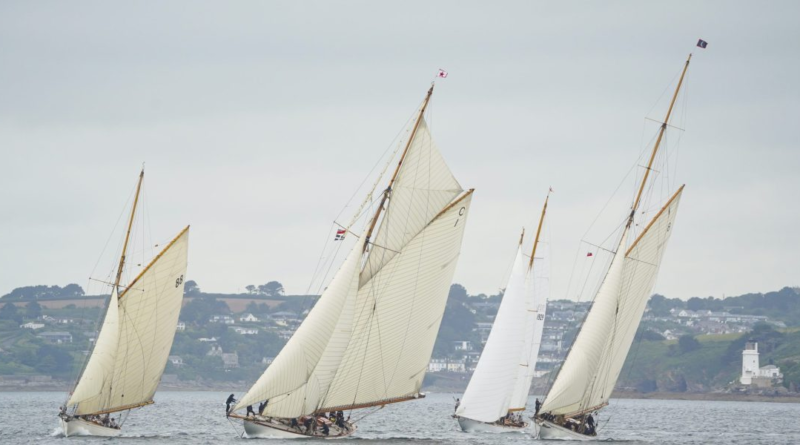How competitive sailing expanded my leadership vision after three decades in the C-suite
As a CEO with a passion for motorsports, I recently found myself in unfamiliar waters—literally. Participating in the Richard Mille Cup regatta was an eye-opening experience that reinforced core leadership principles and offered fresh perspectives on teamwork, adaptability, and decision-making. Here’s what I learned when I traded the boardroom for the high seas.
The most surprising revelation was how leadership fundamentals remain constant across vastly different environments. Whether you’re running a tech company, a motorsports team, or sailing across the English Channel, the essence of leadership is identical. It’s about organizing a group of people to achieve a common goal, accepting responsibility for outcomes, and fostering trust within your team.
On the sailboat, I witnessed this universal truth in action. The captain, much like a CEO, had to make swift decisions, communicate clearly, and ensure every team member understood their role. The hierarchy that emerged during critical moments—calm seas versus stormy weather—mirrored the fluid leadership dynamics in successful companies.
Lessons from the sea
Creating a culture where everyone is constantly looking for ways to be better, faster, and more efficient is key to long-term success. It’s about fostering an environment where questioning the status quo is encouraged and innovation is part of the daily routine.
Competition played a fascinating role in the regatta. While each team was fiercely competitive during the race, there was a remarkable camaraderie afterwards. I witnessed the second-place team enthusiastically cheering for the winners—a powerful reminder that healthy competition can coexist with mutual respect and support.
In business, this translates to recognizing that strong competitors can actually benefit the entire industry. They push us to be better, validate our value propositions, and expand the market for all players.
A common purpose and strong leadership
I had the unique opportunity to sail with two distinctly different crews. One was comprised of career sailors aged 20 to 35, while the other was a more seasoned group ranging from 30 to 70 years old. Despite their differences, both teams exhibited remarkable cohesion and efficiency.
This experience highlighted a crucial lesson for business leaders: Diverse teams, when united by a common purpose and strong leadership, can achieve extraordinary results. It’s not about having the most experienced team or the youngest innovators; it’s about creating an environment where each member’s strengths are leveraged, and everyone is aligned toward the same goal.
Perhaps the most valuable lesson from sailing is the imperative of adaptability. When faced with changing weather conditions, our race plans were completely altered—sometimes within hours of starting. This rapid shift in strategy and execution is something every business leader should take note of.
In the corporate world, we often resist changing course once a decision is made. However, the sailing experience taught me the importance of being willing to pivot quickly when conditions change. It’s not about pride in a decision; it’s about achieving the best possible outcome.
Building relationships
The intensity of sailing forged strong bonds among crew members in a remarkably short time. Within days, strangers became a tight-knit team, united by shared experiences and challenges. This rapid relationship-building process offers a valuable lesson for business leaders.
In our increasingly remote and hybrid work environments, we need to find ways to recreate this intensity of shared experience. Whether it’s through offsite events, team challenges, or innovative collaboration methods, fostering these connections is crucial for building trust and enhancing team performance.
Relentless focus on improvement
Throughout the regatta, I found myself constantly observing, questioning, and learning. This intellectual curiosity—a trait I believe is crucial for innovation in any field—allowed me to draw parallels between sailing and business leadership that I might have otherwise missed.
For instance, the precision required in sailing, where a second can make the difference between winning and losing, reinforced the importance of efficiency and performance in business operations. It made me reflect on how we can bring this level of precision and urgency to our everyday business practices.
In both sailing and motorsports, there’s a relentless focus on improvement. If you’re not faster by the tenth race than you were in the first, you’re falling behind. This mentality is something I strive to instill in my business ventures.
Integrating cross-industry insights
My experiences in technology, motorsports, and now sailing have enriched my understanding of leadership in profound ways. Each field offers unique perspectives that, when combined, create a more comprehensive and nuanced approach to business leadership.
The key is to remain open to these cross-industry insights. Whether you’re in finance, health care, or manufacturing, there are valuable lessons to be learned from seemingly unrelated fields. It’s about being a perpetual student, always ready to absorb new ideas and apply them in innovative ways.
As I reflect on my time at sea, I’m reminded that leadership is an ongoing journey of learning and adaptation. The lessons from the Richard Mille Cup—about teamwork, adaptability, trust, and continuous improvement—have already begun to influence how I approach challenges in my own companies.
For fellow CEOs and aspiring leaders, I encourage you to step out of your comfort zone. Engage in diverse experiences, remain intellectually curious, and always be ready to adapt. The next big leadership insight might just come from the most unexpected place—perhaps even from the deck of a sailboat in the English Channel.
More must-read commentary published by Fortune:
The opinions expressed in Fortune.com commentary pieces are solely the views of their authors and do not necessarily reflect the opinions and beliefs of Fortune.




